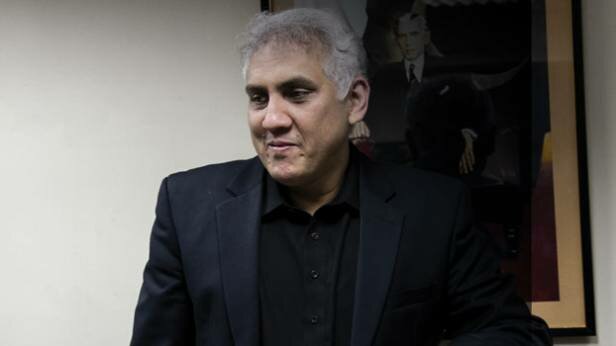First, let’s talk about the elephant in the room: it is unlikely that you - yes, you, reading this article - pay your income tax. Sure, you pay your tax on one of your incomes, but only the bit that is taxed at source. Even that, you wouldn’t have, had it not been automatically taxed.
A presumptuous claim, yes, considering I don’t know you personally. But since a paltry one percent of Pakistanis pay their income tax, I’ll go with my gut and say it is statistically unlikely that you pay your tax.
Your rather flexible morality, coupled with your heightened sense of entitlement from the government, might make you an interesting case study in chutzpah for psychologists to ponder over. But that is not the issue here. The question at hand: what should the government do with you?
How should it catch you? And once it does, what should it do to make an example out of you? You are, after all, a rather slippery fish.
Pakistan’s top taxman, Ali Arshad Hakeem has a couple of ideas.
“Determining income is tough.” says Hakeem, at his office at the Federal Bureau of Revenue, which he heads, “It’s a cash economy. There is much outside the system and it is important to bring it in the system.”
So how does he intend to do that? “Well, people spend or invest what they earn. Nadra can track at least some of that spending activity. This is from where we have gleaned some variables. From those variables, we can estimate total consumption, through which we can estimate total income, through which, of course, we can determine the tax that is due.”
Simple. Consumption has always been taxed (GST, for instance) as an indirect way of taxing income but this methodology attempts to scrutinize consumption to determine income to begin with. This is not specifically out of the box thinking and the methodology has been used before. So how is Hakeem’s plan different? The use of the rich data Nadra has at its disposal (see box) to track consumption patterns, zeroing on carefully selected variables like travel abroad, kids studying abroad, number of cars etc. All of these activities, and more, require use of the CNIC. Hence, all of it is tracked by Nadra.
Hakeem has reason to trust - and be proud of - Nadra’s database. He did spend time building it when he was Nadra chairman.
“Nadra is a goldmine. No country in the world has data at such a level,” he says.
He has a special interest in data mining, the hybrid field of math, statistics and computer science that trawls through huge data sets to discover functional relationships through variables. But there’s a lot that needs to be taken care of before you start your number crunching.
“There is a phrase: let the data talk to you. But that depends on the quality of the data and quality of the questions that you ask,” he says. “The sort of data that we have, specially after linking Nadra with the FBR, is beautiful.”
On paper, at least, that is perhaps what differentiates him from others who would have run the national taxation apparatus. Having run both the organisations, using a data driven model would come easily for him. He’s certainly confident about it.
“We have been using [Nadra’s] data for several things. We have used it to identify the poor and pay them through a mechanised system [with the BISP] and we have had electoral rolls [with the ECP], which have been a great hit.” It is time, he says, to bring some of that magic over to the FBR.
“Look, if we have been successful in tabulating the poorest of the poor, we can also look at the other end of the spectrum. Or at least those with taxable income.”
Compared to the RGST option, this data-driven model, despite its difficulties, is a low-hanging fruit. That is because taxation, as per Pakistani law, is a legislative action rather than an executive one. Which means that any changes on what to tax, how much to tax it and what source to tax it at have to go through parliament.
The elegant RGST scheme was to tax each stage of value addition. But it set the businesses at the various levels against each other, ensuring they correctly report on each other.
Devilishly clever. The parties of the bazaar - the Muslim Leagues and the MQM - were, predictably, not amused. Not much of a rationale was given for their opposition to the plan but, with the level of political discourse in the country where it is, no one really held these parties’ feet to the fire and the media let them get away with the factually incorrect argument that the RGST plan was meant only to increase GST.
Becoming of a civil servant, however, Hakeem avoids blaming the parties. “We will build a more potent case for the system next time.”
And what, exactly, are they going to do next time?
“You see, in VAT [Value Added Tax, which the RGST was, basically] we tax added value. Now the greatest increase in a product’s value is at the retail end. But retail sale is difficult to monitor,” he explains. “The best model to that end, which is already working in China and Turkey, is that a retail machine is linked to us [the taxation system.]”
But how would that prevent leakages? “When the invoice is going to be printed out, there is going to be a prize scheme. So, in addition to the intangible feeling of having done one’s bit for the country, there is going to be a cash incentive for the customer to insist to the retailer to give him his receipt. If the scheme gives ten tickets on a thousand rupees, the shopkeeper can’t give him nine instead.”
It is the VAT specifically that catches the ire of the entire business community.
“Well, they’re supposed to hate all types of tax, what to speak to VAT,” he says, laughing his infectious laugh. “but there is a difference between wants and national interest.”
This is not to imply he has too negative an opinion of the country’s business community. “We have to bring them onboard, actually. I have not meant a single genuine businessman who does not want to pay tax. The thing is that we [the FBR] also have to rationalise ourselves.”
Though the scheme to catch defaulters is expected to rake in an estimated Rs. 700 billion over five years, Hakeem says he doesn’t want to talk about the revenue spike.
“Talking about revenue numbers distort the debate,” he says. “There a number of other aspects to the thing. Number one is fairness; a tax system has to be, above all, fair. Second, it has to be growth oriented. Our system is neither.”
“For the system to be fair, there has to be one law for everyone. For it to be growth-oriented, there has to be a simplification of policies.”
Massive defaulting aside, is our taxation structure systemically unfair? Tremendously, he thinks.
“We have a lot of sectors that are not taxed. Textiles, leather, surgical goods, sports, for instance. There are certain sectors whose domestic sales have actually been zero-rated. The dairy sector, for instance.”
Zero-rating is a pet peeve of taxation officials and a darling of certain extremely well-entrenched business lobbies. By way of explanation: as opposed to exemptions, where a business simply doesn’t have to pay a sales tax on its items, in the zero-rated sectors, businesses actually have the legally-sanctioned gall to demand a refund for the sales tax it paid for all its inputs!
It is these biases that he intends to rectify. “As a result of this system, a pair of extremely expensive shoes bought from a swanky shop would have no sales tax incorporated in the price it but the common man buying a pair of ‘softy’ slippers bought from a thrift store would have to pay sales tax on them. All because plastics don’t have exemptions and leather products do.”
Though it isn’t a federal tax, would he, in the interest of fairness, endorse an agriculture tax?
“There should be an agricultural tax, yes. There should be tax on retail. There should be no zero-ratings and exemptions should be given only in essential areas. The whole world gives exemptions in pharmaceuticals, basic foods, etc. But there has to be tax everywhere to be fair,” comes the emphatic reply.
But certain pivotal sectors demand special treatment and prioritisation, owing to their centrality to our economy. How does one counter such rationalisations?
“Look, if there are more risks in agriculture, then there should be insurance for that, not tax exemptions. In Pakistan, tax is used for laundry for promoting cricket (laughs.) Tax should only be concerned with fairness, growth and revenue. Other problems should have other solutions.”
Amidst all the cynicism, a clear voice full of hope is a little hard to find these days. It is on that front, there is a momentary high that comes from hearing Hakeem speak.
Nothing is more powerful, said Victor Hugo, than an idea whose time has come. There can be debate on what to tax and what not to but the idea of systematically going after those who default on existing taxes is an idea that cannot be opposed, at least not openly. Even if the League, notoriously tax-averse, comes into power after the next elections, it can’t well say there is to be no action against defaulters.
Speaking with the air of a person who has done enough for it not to be undone, he says, “Our time has come. Watch Pakistan after three years and see where we are going to be. If we won’t do it, someone else will. But it will be done.”
Since the nation’s tax defaulters have been made complacent because of a series of false starts in the history of our tax apparatus, there is, perhaps, no clear realisation of the storm that is brewing currently. In about several months’ time, the papers are going to be full of these stories, most of them critical because journalists and media barons alike aren’t too fond of taxes themselves.
You are eventually going to be stopped at the airport, or at the car dealership and informed your transaction cannot take place because your CNIC has been blocked. One only hopes you are ready for it.
Data Darbar
So just what is this scheme of catching these guys by the tail?
The problem: the government doesn’t know how much money people earn or how much money they have. The FBR, in theory, overrides the banks secrecy act but in practice, local banks can rival their Swiss counterparts as stores of ill-gotten gains.
The solution: since no one stuffs their money in a mattress and forgets about it, this money needs to be spent somewhere. The idea is to figure out where they do this spending.
For this, the FBR has zeroed in on a set of variables that track consumption patterns. The Board’s database is to be well-integrated with that of Nadra’s and registers all such consumption activity that would require the use of the CNIC.
All these patterns are variables that are drawn from the Board’s set of existing income taxpayers. A model has been constructed from these variables that estimates income level.
Fair enough. But is it exact? Take foreign travel, for instance, which is one of the variables in the model. What if there are spendthrift individuals who don’t have their spending priorities right? What if there are individuals who do, say, travel abroad, but have to cut into even basic amenities to pay for it? Such outliers are controlled for, statistically. Foreign travel will have a particular correlation with income only if all other factors remain constant.
The peculiarities of an individual’s spending patterns (e.g saving up to go for the Hajj every four years despite having a salary that is so low that it is exempt from income tax to begin with) is not going to throw the model off: the other variables in the model are going to sniff the irregularity and catch up on it.
“Initially, the model had about 1,700 variables,” says Michael Best, a London School of Economics economist, who worked on the FBR’s model, “but we have narrowed it down to 338 variables.”
There is an omniscient rush that one gets when one looks at the model. Much like they would appear to a deity, well-heeled individuals, however high and mighty they might be, look like ants, moving about in their predictable trajectories.
And it is an interesting set of variables to boot. For instance, married men are richer than bachelors, men with two wives, richer and men with three, richer still. But those with four wives are poorer than those with one wife. As has been mentioned earlier, if you have three wives, don’t bother with taking a fourth in an attempt to throw the model off your scent; the other 337 variables will catch up.
Having one to five bank accounts is a poor predictor of wealth. But having six to ten bank accounts is a rather good one: these people are, on an average, 50 percent richer than those with one to five bank accounts. Income starts declining when one has more than twenty accounts.
The number of times a person has renewed her passports is a decent predictor of income and wealth.
Though foreign travel, generally, is a good predictor, things get interesting when one looks at the specific destinations. If you have travelled to France or China in the last year, expect the tax man to pay special attention: these two countries have the highest correlation with income. Hey, the data doesn’t lie.
More interesting still are the variables for car ownership. It would spring no surprises that having more cars is a good predictor of income. Also that within car ownership, certain brands would be better indicators. But it is the top rated brands that are surprising indeed. It would appear that ownership of cars from a category within the Suzuki lineup, which includes models like Jimny, Jeep, Vitara or even APV, has a higher correlation with wealth than ownership of a Mercedes, BMW or Range Rover.
There could be a number of explanations for this. First and foremost, played straight, is the fact that the richest can be more eccentric than those who are merely pretty rich. Some have a greater value for money and would find an expensive car unnecessary. Another explanation is that the original data set, which is derived from existing taxpayers, is skewed towards the salaried class, who lie less about their income, if only because they usually don’t have much of a choice. The other variables, at the risk of repetition, can control for this skewness.
Lock down
The estimated number of defaulters that the model has yielded is three-and-a-half to four million. If one were to include those with inadequate returns, it becomes six million. The plan now, however, is to go after the top 300,000. Even this number is a whopping additional 37 percent of the rough total of 800,000 current taxpayers.
Once defaulters are identified, all their activities, at least the ones that require their CNIC, will be clamped shut. No foreign travel, no car purchases, no buying or selling of property, no getting a cell-phone connection, no getting married, no registering the birth of their kids. Nothing till they settle things with the tax authorities.
The writer is the executive editor.





















